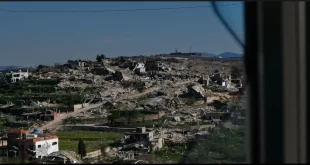Source: https://video.moqawama.org/details.php?cid=1&linkid=2116
Translation: resistancenews.org
Transcript:
Hassan Nasrallah: […] When (in February 2014) Israel hit us in Janta, on the Syrian-Lebanese border, they were hoping to change the rules of engagement, thinking that if they hit us in a border area, we wouldn’t feel obliged to retaliate. We retaliated (hitting an Israeli patrol the following month) in the Shebaa farms (occupied Lebanese territory). When there was the (failed) Israeli drones attack in the southern suburbs of Beirut (in August 2019), I said that we would retaliate outside the Shebaa farms, which did not mean strictly speaking that we forbade ourselves to retaliate there, but it was a clear indication that from now on, no point on the border between Lebanon and occupied Palestine would be immune from our retaliation, and that we could strike anywhere. Previously, Israel was used to always expects our attacks in the Shebaa farms, while all the rest of the border, all the settlements were safe. But I wanted to send this clear message: when you attack us, no point on your (usurped) border will be safe. Israel has been vigilant ever since, and that is why there has been no attacks in Lebanon. Nobody asks why? All those who are eager to get rid of the weapons of the Resistance, can they explain to us why Israel used to attack Lebanon whenever they felt like it from 1948 to 2000, then suddenly stopped, except for the war of 2006? This is thanks to the deterrence equations imposed by the Resistance. Israel knows full well that a retaliation would be inevitable. This is one of the rules of engagement.
So Israel is looking for another way (to attack us). What happened with the drones in the southern suburbs of Beirut was an Israeli attempt to carry out an attack without leaving any fingerprints. They were unmasked because the operation failed, but the goal was to strike without leaving any fingerprints. Because Israel knows very well that if it leaves its mark, it must certainly expect a response from the Resistance, and it knows well what that implies. Even when the tunnels (between Lebanon and occupied Palestine) were discovered, Israel sent to Lebanon through three different channels —Egypt, Cyprus and UNIFIL, i.e. three channels— a message saying that they just wanted to uncover the tunnels, and that they would do nothing more, so that we would stay calm and not fight back. Israel understands that Lebanon is a very sensitive front, and this (deterrence) equation is still valid. This is what protects Lebanon: it is the Resistance.
When it comes to Syria, it must be remembered that at the beginning Israel did not strike anyone —not us, not the Syrians, not the Iranians, or any of the other Resistance movements. Israel let the events unfold in Syria, and was only supporting the armed (terrorist) groups. I’m not saying that the entire Syrian opposition was working with Israel, but there is no doubt that many armed groups linked and coordinated directly with Israel on logistics, security, intelligence, right up to supply and funding, etc. Israel hoped that the regime would collapse and the Syrian army would be dislocated, and that Iran, finding itself unable to do anything, would leave Syria, along with Hezbollah, because the situation would be irretrievably lost. This is what happened during the first few years.
When did Israel start to intervene directly inside Syria? I always say that you have to look at situations from a large point of view, and not be satisfied with the Israeli point of view. You also have to see the other side. The Israeli intervention in Syria is a proof of the victory of Syria and of the victory of the Resistance Axis in Syria. For if Israel had still had any hope that the armed groups & takfiris it was supporting, funding and covering had any chance of winning the war in Syria, they would not have needed to enter the scene.
Journalist: But hasn’t that resulted in an imbalance of deterrence (in favor of Israel, as it strikes Syria with impunity)?
Hassan Nasrallah: I’m coming to it, I’m explaining things step by step. When you read the latest statements by Israeli leaders, when asked why they intervened in Syria, they say it is because they realized that (the terrorist groups) would not win. Israel understood that we were going to win in Syria, that the Syrian army was recovering its health and strength, that the presence of Iran and Resistance factions in Syria was taking root. The takfiri groups that occupied the Syrian part of the Golan have been evacuated, and the Golan is a very sensitive subject for Israel… It can’t even bear anyone taking pictures there! This clearly indicates their weakness. The fact that Israel does not tolerate anyone taking photos of positions in the Golan, [not even the inhabitants of the occupied Golan], is a sign of weakness and not of strength. Seeing that Syria was triumphing and recovering, and that there was no longer any hope of victory for the armed groups, Israel resolved to strike positions here and there, to try to hinder the transfer of Syria’s weapons in Lebanon —everyone knows that our missiles do not fall from the sky, and that Syria’s historic role has been to arm the Lebanese and Palestinian Resistance.
Even in Israel’s recent operation, when they hit one of our cars on the Syrian-Lebanese border…
Journalist: And you retaliated (with an incursion into Israeli territory).
Hassan Nasrallah: I’m not saying we retaliated, and I’m not saying we didn’t hit back. Israel was quite capable of killing our fighters, this is not a mistake on its part. They fired a warning shot, or gave a warning, for the fighters to get out of the vehicle, and then they hit it. Why didn’t they want to kill these young (fighters)? Because there is a clear equation: if Israel kills one of our fighters, whether in Lebanon or Syria, we will retaliate. This equation has been proven in practice (time and time again). This is why when, at the same time as the Israeli drone incident in the southern suburbs of Beirut, two of our fighters were killed (by Israel) in Syria, the Israelis evacuated the border for 7 kilometers, on the whole border. They stayed like that, standing on one leg and a half (ready to run for their lives), for 7 days, and if we hadn’t hit that vehicle, they could have stayed like that for 14 days, a month or two whole months. It’s part of the rules of engagement. So far, when Israel strikes (in Syria), it strives not to kill anyone at all, for it fears it will come to a point where the Syrian leadership, or the leaders of the Resistance, will no longer be able to withstand these strikes. Even in this battle, Israel does not have a free hand (and knows the situation can explode at any moment).
Maybe someone will retort that Israel (often) strikes (Syria) and the Resistance Axis is not responding, and that we should impose a balance of deterrence in Syria. I will be very frank. This issue is continuously discussed and debated. The Syrian leadership is the one who has the last word, because the decision is theirs, even though the battle concerns us all, and we are all targeted. Sometimes there is the impression that Israel’s goal is escalation, and that they want to push the situation into open war against Syria. Syria is (caught) between two priorities: on the one hand, the battle inside is not over, the terrorist and takfiri groups are still present and are on the lookout for the slightest opportunity to gain strength; on the other hand, escalating into a war between Syria and Israel would run counter to the primary objective (of ending the terrorists). Syria still needs time. Let me explain this point well, because there are a lot of people criticizing us, saying that Israel is hitting Syria and Syria is doing nothing. I don’t know how far the Syrian leadership can tolerate these strikes, and there is a threshold that, once crossed, would result in an (inevitable) retaliation (without fear of escalation), but so far they consider that Israel intervenes to protect armed groups and change the equations in their favor, and lead Syria to a regional war; and it is not in the interest of Syria, which is waging a global war on terrorism, to be drawn into a war against Israel, so what it takes is patiently enduring it. This is what we call strategic patience. But within the framework of this (policy of) patience and endurance, there are certain rules which remain valid and which are respected by Israel and by us, and in any case, Israel does not achieve any objective by its strikes: they did not interrupt the transfer (of missiles), and they recognize it themselves; they failed to expel the Iranians from Syria, and they never will, and the same goes for Hezbollah; and they have failed to weaken the Syrian army, which continues to strengthen. We can defeat the objectives of these Israeli attacks without going to a (devastating) regional war, which would not be in Syria’s interest, at least not at this stage.
The danger, and I always warn Israel about this, is that patience has limits. Endurance capacity has limits. The Syrian leadership, and the situation in Syria in general, can absorb some aggression and remedy it within the framework of this vision (of strategic patience), but perhaps Israel will make a mistake or blunder that will exhaust this patience. Israel (isn’t acting rationally, it is) sheer adventurism. Israel has no interest in entering a regional war, and it is very vigilant in this regard.
Journalist: But some analysts say Israel has opted for hit-and-run attacks even if it will lead to war.
Hassan Nasrallah: It’s more psychological warfare than an (accurate) description of reality.
Journalist: Regarding your operation (a triple infiltration into Israeli territory following the destruction of Hezbollah’s vehicle in Syria), Hezbollah did not announce that it had retaliated. But why did you retaliate when there had been no martyrs of the Resistance? Doesn’t the equation say that you only retaliate if your fighters are hit? What was your target?
Hassan Nasrallah: Hezbollah did issue issue a statement on this, so I’ll refrain from commenting. [Hezbollah’s policy is to claim the great majority of its operations, but to leave doubt for some; remember that Israel hardly ever claims its own operations, which is an admission of weakness.] […]
***
Annual interview with Hezbollah Secretary General Sayed Hassan Nasrallah on December 27, 2020, by the Lebanese pan-Arab channel Al-Mayadeen. This interview lasted almost 4 hours.
Source: https://video.moqawama.org/details.php?cid=1&linkid=2184
Translation: resistancenews.org
Transcript:
Hassan Nasrallah: […] Nobody has precise data, sure and reliable information according to which Trump or the Israeli enemy are about to launch some operation in the days which separate us from January 20, if the guy [Trump] ends up submitting to the election result [Laughter] and leaves the White House. But there are analyzes in this direction, especially with a personality of this caliber, affected by so much follies: arrogance, recklessness, effrontery… Especially since this madman is now in a great anger: he is an angry madman. Everyone expects such an act (of madness) and such an eventuality, whether it is actors outside the United States like Iran, Lebanon or Palestine, or elsewhere: even inside the United States, top leaders from both Democratic and Republican parties are worried about what this angry and mad President might do in the next few days, (fearing the worst). So we cannot deny this possibility. But I consider that everything that has been said (on this subject) is only analysis, and is not based on clear and proven information. Even the reports about an an Israeli nuclear warship or submarine sent to the Persian Gulf, via the Suez Canal, are not true, (Israel would never dare to do such a thing). Are the US or Israel going to do something (stupid) or not? Is it a psychological warfare to deter possible armed actions against American troops & interests with the approach of the first anniversary of the assassination of Soleimani and al-Muhandis? All these hypotheses are possible.
The Resistance Axis is very vigilant and watchful during this period (of transition between Trump & Biden), and must scrupulously take care not to be drawn into an escalation, in the slightest point of this Axis. We must not allow ourselves to be dragged to an unmeasured (large-scale) confrontation, to a (total) war whose timing would be the one chosen by our enemies. Of course, (open) war (against the United States and Israel) will (inevitably) happen one day or another, but we are talking about this current timing (we will choose the time and place of the Great War, not them).
Journalist: But don’t you think the threats are particularly pressing? Netyanyahu threatens, the Israeli Chief of Staff threatens…
Hassan Nasrallah: When the Israelis openly threaten and raise their voices publicly, know that these threats do not hide anything material. This is how I understand it: (the more Israel threatens, the less risk of war). We remain vigilant and ready for anything, 24 hours a day, on all battlefields, but this is our analysis: the enormous media hype is a clue that there is nothing serious to fear, it is only psychological warfare, they are only trying to dissuade members of the Resistance Axis from doing anything against them (this is a defensive posture).
Journalist: What do you think of the visit of US Chief of Staff Mark Milley to Israel? In what framework did it happen?
Hassan Nasrallah: Our analysis on this, and it is analysis and not information, is that it has to do with the months and years to come. The Trump administration is about to leave, and a new administration will take its place. It is said that Biden will have a different approach to the Palestinian question, to the resolution of the Israeli-Palestinian and Israeli-Arab conflict: for example, maybe he will support the two-state solution, rejected by Trump & Netanyahu; they have a different take on the details of the Deal of the Century that Trump wanted to impose. With Iran, there is talk of a return of the Biden administration to the nuclear deal, which greatly worries the Israelis and others (Gulf countries), etc. Thus, the Israeli government is worried about the new US administration. Note that it is not the Secretary of State for Defense or the Secretary of State who came: these personalities will no longer be in their posts with the new administration. But as regards the Chiefs of Staff, as a rule, they do not change fundamentally when a new administration takes over, except in some (rare) cases. I think it was not Trump who sent Mark Milley, but the Biden administration, with a message to reassure Israel about what will happe next. […]
 Syria Support Movement solidarity with the Syrian people
Syria Support Movement solidarity with the Syrian people




